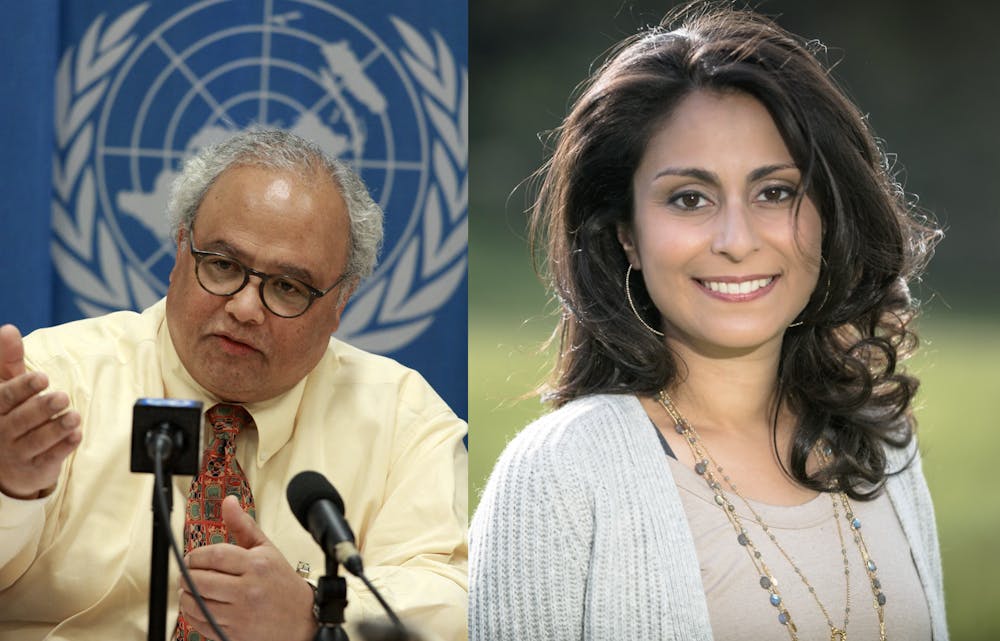Dr. Céline Gounder ’97 and Dr. Eric Goosby ’74 were recently named as members of President-elect Joe Biden’s COVID-19 Advisory Board, which aids the Biden transition team’s response to COVID-19.
“It’s a tremendous honor and privilege to be asked to serve in the midst of a crisis like this, and I’m just glad I have the training and experience to be of help,” Gounder told The Daily Princetonian.
Gounder is Clinical Assistant Professor at New York University and cares for patients at Bellevue Hospital Center. According to the Biden-Harris Transition Team’s official website, she studied how to treat tuberculosis and HIV in South Africa, Lesotho, Malawi, Ethiopia, and Brazil from 1998 to 2012. She later served as Assistant Commissioner and Director of the Bureau of Tuberculosis Control for the New York City Department of Health and Mental Hygiene.
Goosby is “an internationally recognized expert on infectious diseases” and Professor of Medicine at the UCSF School of Medicine, according to the website. He served as the founding director of the Ryan White CARE Act, the largest federally funded HIV/AIDS program during the Clinton Administration. During the Obama presidency, Goosby implemented the U.S. President’s Emergency Plan for AIDS Relief (PEPFAR) and was later appointed as Special Envoy for tuberculosis by the United Nations Secretary General.
Goosby, who majored in biology before attending medical school at the University of California, San Francisco, did not respond to a request for comment.
At the University, Gounder began as a pre-med engineer, but she later switched to Molecular Biology. Her senior thesis, for which she conducted research with professor Arnold Levine at the World Health Organization, inspired her to seek a career in public health.
“Public health allows you to leverage science in service of people,” Gounder said.
After graduating, Gounder deferred her enrollment to Johns Hopkins Bloomberg School of Public Health to work with former presidential candidate and activist Ralph Nader ’55 on Capitol Hill, where she observed policies being created in real time.

“Those are pretty amazing opportunities that are still paying dividends today,” Gounder said.
Gounder and Goosby’s role on the Advisory Board is, among other purposes, to provide a public-health perspective on plans drafted over the last several months. The outgoing Trump administration’s refusal to grant access to confidential intelligence briefings, however, has complicated the Advisory Board’s work.
“The fact that the GSA, so Government Services Administration, has still not gone through ascertainment, or ascertained the election results, is a major problem because that’s preventing us from legally being able to move forward with conversations with folks in the administration right now in terms of interfacing with our counterparts and getting really critical information,” Gounder explained.
She analogized the current situation to a war where those in power withhold essential information.

“Where are we at with our supply chains for any number of critical materials? What’s the quality control on those items? Where are they? How quickly can they be deployed elsewhere, maybe reallocated elsewhere depending on the need?” she asked.
“We’re not being given that information. And so, while we have access to publicly available information, it would be like saying, ‘oh, well, you can wage war reading The New York Times, that’s enough information,’” she said. “I mean, obviously that’s crazy. People are dying in the meantime.”
Though COVID-19 cases are surging across the country, many Americans still intend to travel during Thanksgiving — a fact that Gounder characterized as a paradox.
“If these are people you love and care about, the most important thing you can do to show that you care about them is [to] follow these mitigation measures,” she said.
Gounder believes cases will continue to rise rapidly over December and January, before Biden takes office. She emphasized the widespread danger that faces the United States, which she said faces pandemic conditions similar to those of late February and early March.
“I think people have been through it, they’re exhausted, and I think for them to understand what an emergency we are in right now, what is brewing, what is about to hit, I just don’t think people are ready to hear it,” she said. “And I think they won’t recognize it until it hits them.”
In terms of a vaccine, Gounder urged that promising data from Pfizer and Moderna be taken with a grain of salt. While the vaccines inch closer to federal approval, she believes much remains to be surmounted, including vaccine production and distribution.
“I think there is light at the end of the tunnel, but the tunnel is still long,” she said.








